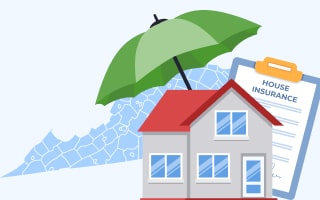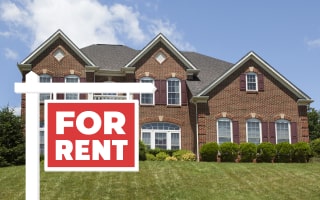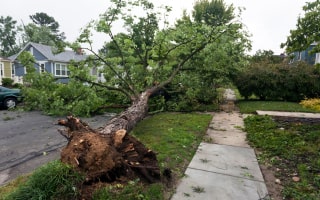Homeowners Insurance in Virginia

Home of the first permanent English settlement, Virginia is rich in history and natural resources. Complete with mountains, a bay area, thick forests, abundant wildlife, and sandy beaches, Virginia has something to offer everyone. Located in the Southeast, Virginia can experience some turbulent weather like tornadoes, landslides, earthquakes, floods, and hurricanes, all of which can cause devastating property damage. Since 1953, Virginia has had 64 federally declared disasters, and the rate of disasters per 1 million people is 7.31.
Along with homeowners insurance claims regarding natural disaster damage, Virginia residents also file claims for water damage due to burst pipes and faulty plumbing, other types of property damage (vehicle/aircraft), fire, bodily injury, theft, medical payments, and vandalism.
States do not require homeowners to carry any type or limits of homeowners insurance coverage. However, if you take out a mortgage to buy the house, your lender will require you to purchase specific limits and keep it on the house for the entire life of the loan.
As of October 2024, the average rate for homeowners insurance is $2,728 a year or $227 a month. In Virginia, homeowners pay an average of $1,658 a year or $138 a month.
Types of Homeowner Insurance Coverage Available in Virginia
American homeowners insurance providers decide where to operate and what types of coverage to provide. Virginia has no shortage of insurance carriers and types of coverage to choose from. The available types are:
-
Dwelling: Your dwelling coverage protects the structure of your home (roof, foundation, walls, plumbing, wiring, etc.) against covered perils. If your home is damaged or destroyed, dwelling insurance will pay to repair or replace it.
-
Other Structures: Other structures coverage protects your detached items like fences, pools, hot tubs, garages, and sheds. It will pay to replace them after a disaster.
-
Personal Property: Personal property coverage pays to replace your belongings should they be stolen or destroyed in a covered event.
-
Liability: If someone gets hurt on your property due to your negligence, liability insurance will pay your legal bills up to a specific limit.
-
Medical Payments: If anyone is injured on your property, medical payments insurance will pay their medical bills.
-
Additional Living Expenses (ALE): If you must leave your home after a covered disaster, ALE insurance will pay for your food, lodging, pet boarding, furniture rental, travel expenses, and more until you can return home.
With so much beachfront property, Virginia residents should also consider a flood policy and a possible umbrella policy to fill in any gaps in coverage.
FEMA (Federal Emergency Management Agency) manages the National Flood Insurance Program (NFIP) through a network of 50 providers across the U.S.
Since most homeowners insurance does not cover floods, this supplemental coverage can repair damage and replace items after a flood. Depending on the options you choose, it can cover the building and/or your personal belongings. This program is available to homeowners, renters, and businesses. Learn more about the program on FEMA's website.
Home Insurance and Natural Disasters
Climate change is causing more frequent and severe natural disasters than ever before, and it's impacting homeowners insurance rates in a big fashion. Over the past five years, rates have steadily climbed by 34%, and in some high-risk areas, they have climbed by as high as 60%. In Virginia, rates have increased by 33.9%, which is close to the national average.
Virginia is prone to landslides, earthquakes, floods, and hurricanes. Typically, Virginia sees at least one tropical storm yearly and a hurricane every 2-3 years. Even one water and freezing claim cost insurers an average of $11,650. Wind and hail claims average $11,695. On average, Virginia sees 700 wildfires annually, damaging 60 homes, and a single claim for fire damage costs $77,340. From 2015 to 2019, Virginia insurance providers lost a total of $1,302,552,800. From 1980 to 2024, Virginia had 110 billion-dollar disasters.
How Can I Save on Homeowner Insurance Premiums in Virginia?
As homeowners insurance rates spike nationwide, homeowners need a way to save. The best way to save on your home insurance is to fully understand the factors that impact it. Those factors include:
-
Location: Location is the number one factor driving insurance rates. If you live in an area prone to disastrous weather or high crime, you will pay more than somewhere safe and quiet.
-
Age of the Home: The age of your home matters quite a bit. The older the home, the more premiums you will pay.
-
Coverage Amount: The more insurance you purchase, the higher the price.
-
Size of the Home: The larger the home, the more your insurance premiums will be because it will cost more to rebuild after a disaster.
-
Condition of the Home: Homes in poor condition cost more to insure than homes in good condition.
-
Deductible: The higher your deductible, the lower your rates will be. Conversely, the lower the deductible, the higher your rates.
-
Credit History: Your credit history indicates your level of responsibility and risk. If you have poor credit, your rates will be higher than if you have a high score.
-
Claims History: If you have filed many claims in the past (even with another carrier), your rates will be much higher than if you have a clean claims history.
-
Pets: Your rates will be higher if you have certain breeds of dogs or other "perceived dangerous" pets.
Some ways to save on your homeowners insurance include:
- Raise Your Deductible: Raise your deductible as high as possible to lower your premiums.
- Adjust Your Coverage: Review your coverage each year and lower your coverage limits if you need to save money on your rates.
- Improve Your Credit: Work on improving your credit and then ask your insurer to adjust your rates accordingly.
- Make Your Home Safer: Install home security to make your home safer and save on home insurance.
- Bundle Policies: Bundle all your policies with the same provider for lower rates.
- Ask for Discounts: Ask your insurance company for any applicable discounts.
- Avoid Risks: Don't add new risks to your home and eliminate existing ones.
- Don't File Small Claims: Don't file any small claims; wait until you really need it before using your insurance.
- Home Improvements: Improve your roof, windows, and siding to make your home more weather-resistant and get lower rates.
Home Insurance Discounts in Virginia
Home insurance is financial protection for your home. If your home is damaged or destroyed in a covered peril, your insurance company will pay to restore it to its previous condition. These policies include dwelling coverage, which protects the structure (roof, walls, plumbing, electrical, etc.), personal property, liability, other structures, medical payments, and loss of use. Some qualifying disasters include fire, windstorms, theft, and vandalism.
Typically, it's very easy to get a policy. Find a company you want to work with and contact them via phone (800 number) or apply online through their website. Some have calculators to help you determine the proper coverage. You can also find a local agent to help you if you want more personalized service.
Some standard discounts offered by home insurance firms include:
- Senior Discount: Retirees and senior citizens often pay less for home insurance due to discounts related to age.
- Military Discount: Many firms offer home insurance discounts to military personnel (active and retired).
- Job-Related Discount: Government workers, firefighters, and teachers get discounts for their occupations.
- Non-smoker Discount: Non-smokers earn a discount for having a lower fire risk.
- Loyalty Discount: If you stay with the same company for many years, they may offer you a discount year after year.
- Autopay Discount: Sign up for autopayments, and your insurance provider may offer a discount.
- Paperless Discount: Opt in for paperless billing, and your insurer may discount you.
- Multi-policy Discount: Bundle all your insurance with the same provider, and they may offer you some money off your rates.
- Home Safety Discount: Improve your home safety with sprinklers, smoke alarms, and fire extinguishers to qualify for a discount on your home insurance.
- Security Discount: Install a home security system to keep your home safer and earn a discount.
- New Home Discount: New homes cost far less to insure than older homes.
- Green Discount: Install green appliances throughout your home and help the environment while earning a discount.
- Claims-Free Discount: Stay claims-free for as long as possible to earn home insurance discounts.
Common Rates Offer by Homeowners Insurance Firms
New homes cost a lot less to insure than older homes. In some cases, you can save up to 40% less on your home insurance for a new construction home or up to 26% less on a home five years old or younger. In Virginia, homeowners pay an average of $983 for insurance on a new construction home. Your actual rate will vary based on your customer profile (age, credit score, claims history, etc.).
Top 10 Home Insurance Firms in Virginia and Average New Home Savings
| Company | % savings |
|---|---|
| Nationwide | 76% |
| Amica | N/A |
| State Farm | 51% |
| Travelers | 63% |
| Allstate | 47% |
| USAA | 54% |
| Erie Insurance | 51% |
| Lemonade | N/A |
| Chubb | N/A |
| Liberty Mutual | N/A |
Home Insurance and Renovations in Virginia

Home renovations can transform the drab into spectacular, but these updates can also impact your insurance premiums considerably. Some upgrades add risk or value and cause your rates to go up. Others can lower risk and your rates, but some actually do both simultaneously and cancel each other out.
![]() Home Renovations that Increase Rates
Home Renovations that Increase Rates
Some home renovations that increase your rates include:
- Install a Pool or Hot Tub: Although hot tubs and pools are fun, insurance companies consider them "attractive nuisances", and your rates will increase if you add one.
- Adding a Home Office: Adding more space to work at home can help your work/life balance. However, it will also add more value to the house, increasing your rates. Plus, some items like office equipment may need their own policy.
- Luxury Appliances/Fixtures: Adding luxury appliances and light fixtures can make your home sparkle, but they also cost more to replace and will add to your premiums.
![]() Home Renovations that Decrease Rates
Home Renovations that Decrease Rates
Some home renovations that decrease your rates include:
- Hurricane Straps/Ties: Fortifying your home with hurricane straps and ties could help avoid claims and keep your home safe. These reinforcements could also help you save on insurance.
- Storm-Resistant Roof: Installing a new storm-resistant roof that better withstands storms can help lower your insurance costs.
- Upgrade to Storm Windows: Storm or shatterproof windows are a good idea, especially in Minnesota, where tornadoes and windstorms are prevalent. They can also help you save money on your home insurance.
Installing new siding can make your home safer against storms, but if you use luxury materials, your rates may go up, canceling out any decrease due to safety.
Voluntary upgrades are not covered under homeowners insurance. Home insurance pays only to rebuild or repair your house after a disaster like a hurricane. Other things not covered are anything outside your policy limits, such as pest infestations, animal damage, and rodents.
Always be sure to update your policy after any renovations. Have a carrier representative view the changes and reassess the value and premiums. Although your monthly cost may increase, you will have peace of mind that your home is protected.
Virginia Renters' Insurance

Virginia renters also need homeowners insurance. However, renters insurance is slightly different. First, there is no dwelling coverage to protect the structure. The owner must cover that. The primary purpose of renters insurance is to protect your personal property. Your insurance company will pay to replace your belongings if they get destroyed by a covered event. Most policies also include liability, medical payments, and loss of use coverage. Each policy has limits, and expensive items like electronics, jewelry, furs, collectibles, cars, and art may not be covered. Some covered perils include fire, windstorms, theft, and vandalism.
Some of the items that renters insurance covers are:
-
Small Appliances
-
Furniture
-
Clothing
-
Bedding
-
Bath Items
-
Electronics
-
Sporting Equipment
Renters insurance is priced according to three main factors, and they are:
-
Location: Even as a renter, your location matters. If you live in the city, you will pay more than if you live in the country. If your area has many weather events, you will pay higher rates.
-
Coverage Amount: The more coverage you buy, the higher your premiums.
-
Number of Units: The more units in your building, the lower your rates.
The average renter in Virginia pays about $15 a month or $185 a year, which aligns with the national average of between $15-$20/month. People living in urban areas where crime is higher will pay more than those living in suburban or rural areas.
Condo Insurance in Virginia

Condo insurance is homeowners insurance for condo owners, but it works differently. Condo associations have master policies that protect each building in the development. After a qualifying event, that master policy will pay to repair or replace the condo back to its original condition (when it was first built). The problem is that most condo owners have significantly updated flooring, kitchens, cabinets, countertops, baths, lighting fixtures, and appliances. Their condo insurance restores those items and everything else from the "walls in" back to its most current condition. Condo insurance also includes personal property protection, liability and medical payments insurance, loss assessment, and loss of use (ALE).
Unlike renters insurance, which has no dwelling coverage, condo insurance has limited dwelling coverage (walls-in only). The liability portion only applies if the person gets hurt inside the condo. Condo insurance will replace:
- Interior Walls
- Flooring
- Wiring
- Plumbing
- Furniture
- Appliances
- Countertops
- Cabinets
- Personal Possessions
Condo owners in Virginia pay an average of $31 a month or $370 a year, which is far less than the national average of $625 a year for $60,000 of personal property, $300,000 of liability coverage, and a $1,000 deductible.
Some ways to save on condo insurance in Virginia are:
- Shop Around and Compare Prices
- Bundle Your Home and Auto Together
- Increase Your Deductible
- Look for Other Discounts
- Upgrade Your Home with a Security System
- Keep Your Credit Score High
- Avoid Small Claims
Virginia Home Insurance Market
The entire homeowners insurance market is in trouble. Almost no state is immune to the severe weather trends and resulting claims and losses. Over the past decade, Virginia insurers have seen profits dwindle, and losses have doubled. As climate change impacts the U.S. even further, these trends will continue until some providers leave the state, slimming competition and making it harder for customers to get coverage.
Virginia is subject to severe weather events like tornadoes, landslides, earthquakes, floods, and hurricanes, all of which can cause enormous property damage and significant losses. Insurance providers may have to limit coverage or cancel some high-claims customers to protect themselves.
Each state decides how to regulate the homeowners insurance industry. The state appoints a department or agency specifically to monitor providers and rates, investigate customer complaints, and sanction guilty firms. In Virginia, that agency is the Bureau of Insurance, P.O. Box 1157, Richmond, VT 23218.
Homeowners Insurance Guide
- Homeowners Insurance in Virginia
- Types of Homeowner Insurance Coverage Available in Virginia
- Home Insurance and Natural Disasters
- How Can I Save on Homeowner Insurance Premiums in Virginia?
- Home Insurance Discounts in Virginia
- Home Insurance and Renovations in Virginia
- Virginia Renters' Insurance
- Condo Insurance in Virginia
- Virginia Home Insurance Market
Instant Access to Virginia Property Records
- Owner(s)
- Deed Records
- Loans & Liens
- Values
- Taxes
- Building Permits
- Purchase History
- Property Details
- And More!
Homeowners Insurance Guide
- Homeowners Insurance in Virginia
- Types of Homeowner Insurance Coverage Available in Virginia
- Home Insurance and Natural Disasters
- How Can I Save on Homeowner Insurance Premiums in Virginia?
- Home Insurance Discounts in Virginia
- Home Insurance and Renovations in Virginia
- Virginia Renters' Insurance
- Condo Insurance in Virginia
- Virginia Home Insurance Market